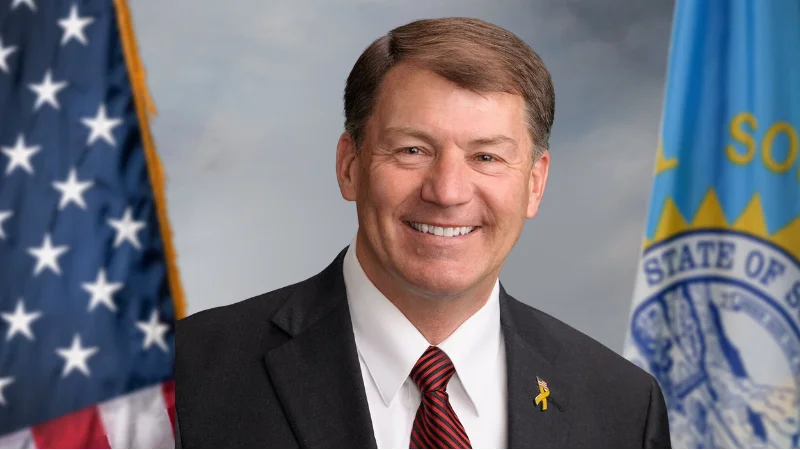Senator Mike Rounds, US Senator for South Dakota | Official U.S. Senate headshot
Senator Mike Rounds, US Senator for South Dakota | Official U.S. Senate headshot
U.S. Senator Mike Rounds (R-S.D.), a member of the Senate Committee on Banking, Housing, and Urban Affairs, has introduced the Merchant Banking Modernization Act. The proposed legislation would extend the holding period for merchant banking investments from 10 to 15 years.
Rounds stated, “Access to capital remains a barrier for entrepreneurs to start up and grow their business, especially in rural states like South Dakota. Small businesses, a central pillar of our state economy, make up 99 percent of the businesses in South Dakota and employ 58 percent of our workforce. The Merchant Banking Modernization Act seeks to bridge the financial gap between small, often rurally-based, businesses that are not privy to the type of investments larger, more established, companies are able to access.”
The bill is co-sponsored by several senators including Banking Committee Chairman Tim Scott (R-S.C.), Thom Tillis (R-N.C.), Bill Hagerty (R-Tenn.), Kevin Cramer (R-N.D.), Steve Daines (R-Mont.), Markwayne Mullin (R-Okla.), Rick Scott (R-Fla.), Ted Cruz (R-Texas), and John Cornyn (R-Texas). It has received support from organizations such as the U.S. Chamber of Commerce, Independent Community Bankers of America, and the South Dakota Bankers Association.
Scott commented on the proposal: “Small businesses are the backbone of our economy, both in my home state of South Carolina and across the United States, but they need access to capital to grow and support their employees. This bill will support investment in local businesses and help ensure more Americans have a shot at the American Dream.”
Tillis added: “Small businesses drive job creation and economic growth in North Carolina, but too often they struggle to secure the long-term capital needed to expand. By extending the merchant banking investment window, this legislation will help attract investment in businesses that are vital to our state. I’m proud to support this effort to strengthen North Carolina’s economy and expand opportunities for entrepreneurs.”
Cornyn also voiced his backing: “By extending the holding period for merchant banking investments, this legislation would help Texas small businesses access the capital needed to grow and thrive, and I’m proud to support it.”
Mullin noted his experience as a business owner: "With over twenty-five years of firsthand experience as a business owner, I know just how necessary access to capital is to grow your operation. By expanding the holding period, the Merchant Banking Modernization Act will boost small businesses in Oklahoma and across the country."
Daines emphasized local impact: “Small businesses are the cornerstone of Montana’s economy and represent 99 percent of all businesses in our state. As the son of a contractor, I’ve seen firsthand how difficult it can be to keep a company flourishing, and we need to do everything we can to help small businesses grow and remove unnecessary barriers to accessing capital. I’m proud to join my colleagues to introduce this bill, which will support investment in small and rural businesses and unleash our economy.”
Rick Scott explained further: “Small businesses are the backbone of our economy, and as a former business owner, I understand firsthand how businesses are critical to the success of our economy, to creating jobs, and to sustaining everyday life. This legislation makes a common-sense change to help give investors the confidence and flexibility to support entrepreneurs who need more time to grow and stabilize -- especially in rural and underserved communities –-to support job growth and long-term economic prosperity.”
The background section notes that under current rules stemming from provisions set by laws such as the Bank Holding Company Act of 1956 and regulations implemented after passage of Gramm-Leach-Bliley Act in 2001 by federal agencies including Federal Reserve Board Governors [see https://www.federalreserve.gov/aboutthefed.htm], bank holding companies operating as financial holding companies must divest their merchant banking investments within ten years. Lawmakers argue that this requirement has discouraged investment into smaller or less established companies that may require longer periods before generating returns.
The proposed extension would allow entities involved in merchant banking activities an additional five years before divesting their holdings—an effort supporters say could incentivize greater investment into small business sectors.
For those interested in further details about legislative language or specifics regarding regulatory frameworks governing these investments since 2001—including joint rules from federal regulators—more information can be found via official resources [see https://www.federalreserve.gov/aboutthefed.htm].




 Alerts Sign-up
Alerts Sign-up